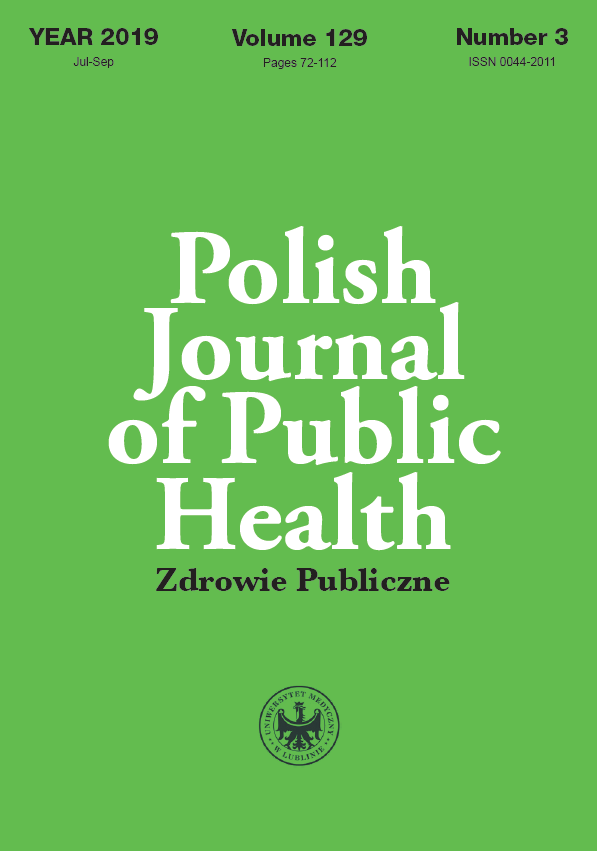Algorithm for the development of systemic pharmaceutical care messages aimed at clinicians as exemplified by community – acquired pneumonia
DOI:
https://doi.org/10.2478/pjph-2019-0018Keywords:
quality of pharmacotherapy, community-acquired pneumonia, pharmaceutical careAbstract
Introduction. Medication errors, which are increasing in number every year worldwide, represent a significant part of the development of adverse pharmacotherapy results, what creates the need to develop additional tools and means that could effectively provide mechanisms of rational pharmacotherapy.
Aim. Development of an algorithm for the creation of systemic messages of pharmaceutical care aimed at clinicians, concerning specific nosology.
Material and methods. The object of the study was the medical documentation of 540 patients of the therapeutic unit who were diagnosed with community-acquired pneumonia. The quality analysis of the prescribed pharmacotherapy was conducted according to our modified European Classification Scheme PCNE V5.01 for detection of drug-related problems (DRP).
Results. As many as 8386 DRPs were detected in the analyzed 540 medical prescriptions. Based on them, 276 systemic pharmaceutical care messages were formed, which are related to nosology in general and aimed at clinicians.
Conclusions. According to the results of the pharmacotherapy quality assessment of 540 patients, in particular those with community-acquired pneumonia, 8386 DRPs were identified, which confirmed our scientific hypothesis regarding its low quality. The proposed algorithm for the development of systemic pharmacy care messages aimed at clinicians may serve as an additional tool that could effectively provide rational pharmacotherapy mechanisms.
References
1. Alanazi MA, Tully MP, Lewis PJ. A systematic review of the prevalence and incidence of prescribing errors with high-risk medicines in hospitals. J Clin Pharm Ther. 2016;41(3):239-45.
2. Moriarty F, Hardy C, Bennett K, Smith SM. Trends and interactions of polypharmacy and potentially inappropriate appointment in primary care for 15 years in Ireland: a re-transverse study. BMJ Open. 2015;5(9). https://bmjopen.bmj.com/content/bmjopen/5/9/e008656.full.pdf
3. Elden NM, Ismail A. The Importance of Medication Errors Reporting in Improving the Quality of Clinical Care Services. Glob J Health Sci. 2016;8(8):243-51.
4. Makary MA, Daniel M. Medical error—the third leading cause of death in the US. BMJ. 2016;353:2139.
5. Rodziewicz TL, Hipskind JE. Medical Error Prevention. StatPearls. Treasure Island (FL). https://www.ncbi.nlm.nih.gov/pubmed/29763131
6. Sekh M, Zimenkovsky A. Community-acquired pneumonia: quality of pharmacotherapy and expense of irrationality. Pharmacia. 2018;65(4):25- 37
7. Order of MOH of Ukraine № 128 from 19.03.2007. On the approval of clinical protocols for the provision of health care in the specialty “Pulmonology”. http://www.moz.gov.ua.
8. BTS Guidelines for the Management of Community Acquired Pneumonia in Adults. Thorax. 2009. p.55.
9. Guidelines for the Diagnosis and management of community- and hospital-acquired pneumonia in adults: summary of NICE guidance. (Published 03 December 2014). https://www.ncbi.nlm.nih.gov/pubmed/25471702
10. State Registry of PAs of Ukraine. MOH of Ukraine. Kyiv; 2017. http:// www.drlz.com.ua/.
11. Classification for Drug related problems. V5.01. 01.05.2006. Pharmaceutical Care Network Europe Foundation. The PCNE Classification V5.01. https://www.pcne.org/upload/files/16_PCNE_classification_V5.01.pdf
12. Ryvak T, Makukh Kr, Zimenkovsky A, Gorodnycha O. Pharmacotherapy assessment with reference to existing cardiological practice in Ukraine. Pharmacia. 2014; 61(1). P. 3-11.
13. Ponomarenko VM, Zimenkovsky AB, Yu O. Grem. Economic aspects of irrational pharmacotherapy. Bull Soc Hygiene and Health Protection Organ of Ukraine. 2005;3:66-71.
14. Ernst FR, Grizzle AJ. Drug-related morbidity and mortality: updating the cost-of-illness model. J Am Pharm Assoc. 2001;41:192-9.
Downloads
Published
Issue
Section
License
Copyright (c) 2020 Polish Journal of Public Health

This work is licensed under a Creative Commons Attribution-NonCommercial-NoDerivatives 3.0 Unported License.


